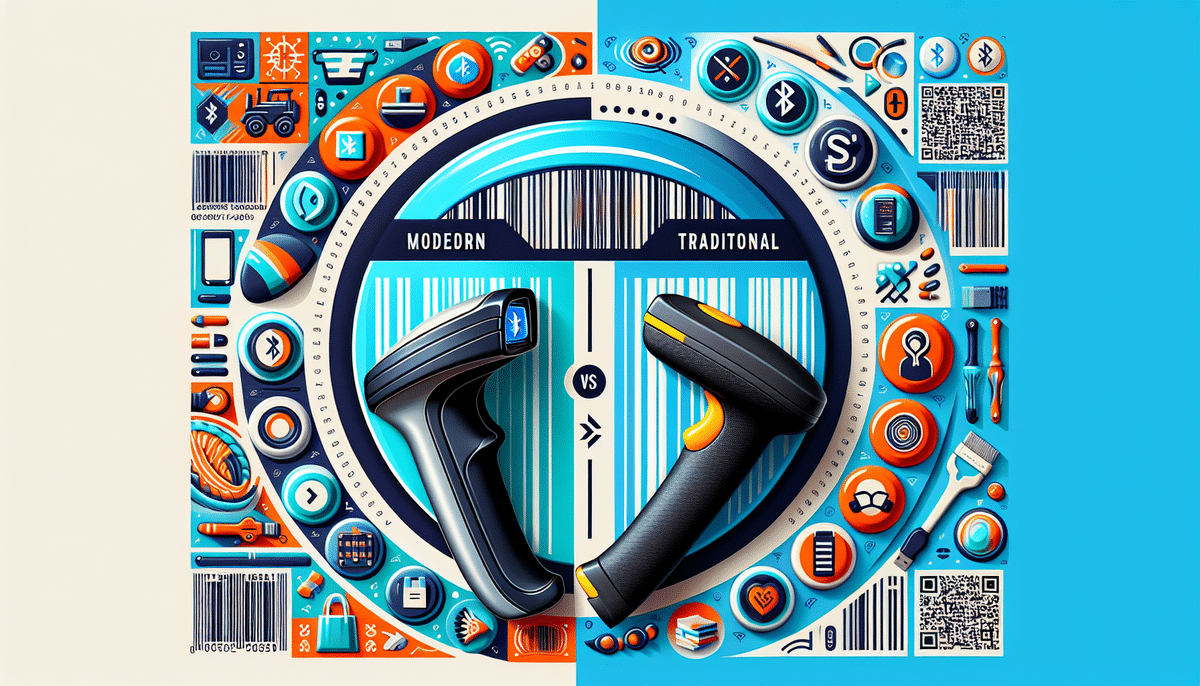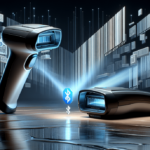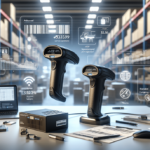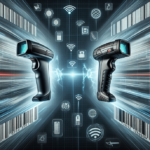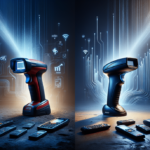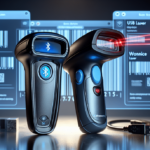Socket Mobile S700 vs Zebra DS2208: Comprehensive Comparison for 2024
When selecting a barcode scanner for your business, choosing the right model can significantly impact efficiency and accuracy. Two of the most popular options in the market are the Socket Mobile S700 and the Zebra DS2208. Both devices are engineered to streamline barcode scanning processes, but they present distinct features and capabilities. This article offers an in-depth comparison of the Socket Mobile S700 and Zebra DS2208, examining their features, design, performance, connectivity, ease of use, battery life, pricing, and suitability for various industries.
Overview of Socket Mobile S700 and Zebra DS2208 Barcode Scanners
Key Features and Functionalities
The Socket Mobile S700 and Zebra DS2208 are versatile handheld barcode scanners capable of reading a wide range of barcodes, including 1D, 2D, and QR codes. They are widely utilized across industries such as retail, healthcare, and logistics for tasks like inventory management, price verification, and shipment tracking. While both scanners offer similar basic functionalities, they diverge in several critical areas including design, connectivity, and pricing.
Design and Ergonomics
The design of a barcode scanner can influence user comfort and productivity. The Socket Mobile S700 boasts a sleek, modern appearance with a slim profile, making it lightweight and comfortable for prolonged use. Its ergonomic design is complemented by a rubberized grip, enhancing durability and ease of handling.
In contrast, the Zebra DS2208 features a more traditional and bulkier frame. While it may not be as sleek as the S700, the DS2208 is built with a sturdy rectangular shape and a neutral color scheme, which contributes to its durability and reliability in various work environments.
Detailed Feature Comparison
Scanning Capabilities
The Socket Mobile S700 is equipped with a 1D/2D scanner engine, enabling it to decode a vast array of barcode types, including complex QR codes. This versatility makes it suitable for applications requiring the scanning of detailed information from mobile devices and printed materials.
On the other hand, the Zebra DS2208 offers omnidirectional scanning, allowing it to read barcodes from any angle without the need for precise aiming. This feature is particularly beneficial in high-volume environments where speed and efficiency are paramount.
Connectivity Options
Connectivity plays a crucial role in integrating barcode scanners into existing systems. The Socket Mobile S700 supports both Bluetooth and USB connections, providing flexibility for wireless integration with smartphones, tablets, and computers. It can maintain simultaneous connections with up to seven devices, enhancing its functionality in multi-device setups.
Conversely, the Zebra DS2208 is limited to USB connectivity. While USB connections are reliable for fixed setups like POS systems and desktop computers, they may restrict the scanner's versatility in environments that require mobility and wireless integration.
Battery Life and Performance
Battery longevity is a critical factor for businesses that rely on uninterrupted scanning operations. The Socket Mobile S700 boasts an impressive battery life, supporting up to 16 hours of continuous usage on a single charge. This extended battery performance minimizes downtime and enhances productivity.
The Zebra DS2208 offers a slightly shorter battery life of approximately 14 hours. While sufficient for most daily operations, it may require more frequent charging in high-demand settings.
Durability and Build Quality
Durability is essential for barcode scanners used in demanding environments. The Socket Mobile S700 is constructed with durable materials and a rubberized grip, making it resistant to drops and wear from frequent use. It is designed to withstand the rigors of daily handling in fast-paced settings.
The Zebra DS2208 is similarly built for durability, with a robust rectangular shape capable of withstanding drops from up to 5 feet. Its sturdy construction makes it ideal for rugged environments such as warehouses and distribution centers.
Ease of Use and Setup
Setup Process
Ease of setup can significantly impact the deployment time of barcode scanners within an organization. The Socket Mobile S700 requires downloading a mobile application for configuring settings and updating firmware. This additional step allows for greater customization but may extend the initial setup time.
In contrast, the Zebra DS2208 is a plug-and-play device. Users can start scanning immediately upon connecting the scanner to a compatible device, eliminating the need for additional software installations and simplifying the setup process.
User Interface and Experience
Both scanners are designed with user-friendliness in mind. The Socket Mobile S700's sleek design and intuitive buttons make it easy to operate, even for first-time users. Its compatibility with a wide range of software applications ensures seamless integration into existing systems.
The Zebra DS2208 features a straightforward interface with easy-to-access buttons, catering to users who prefer simplicity and reliability. Its ergonomic design contributes to a comfortable user experience, reducing fatigue during extended scanning sessions.
Pricing and Value
Cost-effectiveness is a significant consideration for businesses when selecting barcode scanners. Generally, the Socket Mobile S700 is positioned at a higher price point compared to the Zebra DS2208. This pricing difference reflects the S700's advanced features, including Bluetooth connectivity and longer battery life.
The Zebra DS2208 offers a more affordable option without compromising on essential scanning capabilities. Its omnidirectional scanning and durable build make it a valuable investment for businesses seeking reliable performance within a budget.
It's important to consider the total cost of ownership, including potential savings from increased efficiency and reduced downtime, when evaluating the value of each scanner.
Customer Feedback and Ratings
Customer reviews provide valuable insights into the real-world performance and reliability of barcode scanners. The Socket Mobile S700 has received favorable feedback on platforms like Amazon, with an average rating of 4.5 out of 5 stars. Users commend its versatility in scanning various barcode types and its robust battery life. However, some users have noted occasional Bluetooth connectivity issues that may require troubleshooting.
The Zebra DS2208 garners an average rating of 4.7 out of 5 stars. Customers praise its ease of use, reliable performance, and durable construction. The omnidirectional scanning capability is frequently highlighted as a major advantage, particularly in high-speed scanning environments.
Overall, both scanners are well-regarded by users, with each model catering to specific needs and preferences.
Industry Applications and Use Cases
Retail
In the retail sector, efficient barcode scanning is critical for inventory management, checkout processes, and price verification. The Socket Mobile S700’s ability to scan QR codes enhances capabilities for mobile payments and digital promotions. Its Bluetooth connectivity allows seamless integration with mobile POS systems, supporting dynamic retail environments.
The Zebra DS2208’s omnidirectional scanning ensures quick and accurate scanning at checkout points, reducing customer wait times and improving overall service efficiency.
Healthcare
Healthcare facilities rely on barcode scanners for patient identification, medication administration, and inventory control. The Socket Mobile S700’s 2D scanning capability enables quick reading of complex codes found on medical devices and patient wristbands. Its wireless connectivity facilitates mobile use across different departments.
The Zebra DS2208 provides reliable 1D barcode scanning for tracking medications and managing inventory, ensuring accuracy and compliance with healthcare standards.
Logistics and Warehousing
In logistics and warehousing, the ability to scan barcodes rapidly and accurately is essential for tracking shipments and managing inventory. The durable build of the Zebra DS2208 makes it suitable for rugged warehouse environments, where robust equipment is necessary to withstand frequent use and harsh conditions.
The Socket Mobile S700 offers flexibility with its Bluetooth connectivity, allowing workers to move freely while scanning, which can enhance operational efficiency in large or dynamic warehouse settings.
Conclusion: Making the Right Choice for Your Business
Choosing between the Socket Mobile S700 and Zebra DS2208 depends on your specific business needs and operational requirements. If your organization values advanced features such as Bluetooth connectivity, longer battery life, and the ability to scan a variety of barcode types, the Socket Mobile S700 is an excellent choice. Its versatile scanning capabilities and ergonomic design make it suitable for businesses that demand flexibility and extended use.
Alternatively, if affordability, reliable performance, and ease of use are your primary concerns, the Zebra DS2208 stands out as a strong contender. Its omnidirectional scanning and durable construction make it ideal for environments that require fast and accurate barcode reading without the need for additional connectivity options.
Both scanners are reputable and widely used across various industries, ensuring that whichever model you choose will enhance your business operations through efficient and accurate barcode scanning.
Final Thoughts on Socket Mobile S700 vs Zebra DS2208
In summary, the Socket Mobile S700 and Zebra DS2208 are both exceptional barcode scanners, each offering unique features tailored to different business needs. By thoroughly evaluating their design, performance, connectivity, battery life, and user feedback, you can make an informed decision that aligns with your operational goals and enhances your workflow efficiency. Investing in the right barcode scanner is a pivotal step towards achieving greater accuracy, productivity, and customer satisfaction in your business operations.















